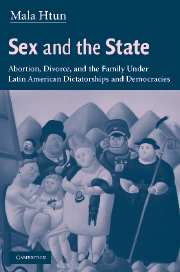 Sex and the State
Sex and the State Book contents
- Frontmatter
- Contents
- Acknowledgments
- Note on Translations
- 1 Sex and the State in Latin America
- 2 Four Normative Traditions
- 3 Reforming Women's Rights Under Military Dictatorships
- 4 Church and State in the Struggle for Divorce
- 5 Completing the Agenda: Family Equality and Democratic Politics
- 6 Why Hasn't Abortion Been Decriminalized in Latin America?
- 7 Conclusion
- References
- Index
4 - Church and State in the Struggle for Divorce
Published online by Cambridge University Press: 08 January 2010
- Frontmatter
- Contents
- Acknowledgments
- Note on Translations
- 1 Sex and the State in Latin America
- 2 Four Normative Traditions
- 3 Reforming Women's Rights Under Military Dictatorships
- 4 Church and State in the Struggle for Divorce
- 5 Completing the Agenda: Family Equality and Democratic Politics
- 6 Why Hasn't Abortion Been Decriminalized in Latin America?
- 7 Conclusion
- References
- Index
Summary
Divorce's legal status is profoundly consequential for private lives and relationships. Divorce provokes intense conflicts within public institutions. These dual aspects of divorce were acutely evident in late twentieth-century Latin America, when the struggle to legalize divorce threatened to unravel the historic bargains forged between Church and state over the terms of marriage and its dissolution. Insisting that the social problems created by lack of divorce demanded resolution and that Roman Catholic ethics should be absent from public decision making, the partisans of divorce mobilized throughout political and civil society. In defense of Catholic doctrine, bishops and principled believers dug in their heels to defend the sanctity of the institution of marriage. Debates between the partisans and opponents of divorce centered not just on evolving social practices, such as rates of separation, consensual union, and illegitimacy, but also on the public status of the Roman Catholic Church. Family values figured prominently in deliberations on divorce, but so did competing claims about the civil or divine nature of marriage, the separation between Church and state, and the origins and purposes of the civil law.
This chapter's comparative historical analysis of Brazil, Argentina, and Chile illustrates the personal and ethical dilemmas provoked by the issue of divorce and theorizes the political conditions that make legal divorce possible. The three countries faced similar social problems created by growing rates of marital breakdown and illegitimacy, but patterns of policy change on divorce were dramatically different.
- Type
- Chapter
- Information
- Sex and the StateAbortion, Divorce, and the Family under Latin American Dictatorships and Democracies, pp. 78 - 112Publisher: Cambridge University PressPrint publication year: 2003
